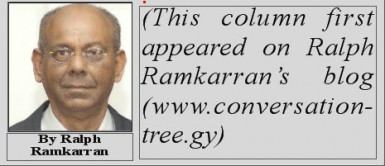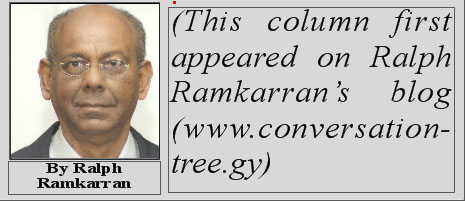The last general and regional elections were characterized by extensive delay in announcing election results and there was an outcry against it. International observers commented unfavourably about the delay and recommended an earlier announcement of the results. It remains an issue which has not yet been resolved. It is surprising that there has not been no been review of the basis on which results are declared. I wrote about it before carried in Sunday Stabroek on January 26, 2014 (‘Election results’).
In a report in SN on January 15 the Chairman of Gecom, Dr Steve Surujbally is reported to have said in response to a call from the PPP for an earlier declaration of election results, that “while the commission will move expeditiously to declare the results of the upcoming General Elections it will not sacrifice accuracy to do so.” Much the same sentiments were expressed in another statement quoted in another section of the press yesterday.
Is accuracy only guaranteed by the announcements of results from statements of poll in the physical possession of Gecom?
 Certified results are compiled under sections 83 to 90 of the Representation of the People Act. These require presiding officers of polling stations, among other duties, to count the votes received by contesting parties, prepare the results, deliver copies to various officials, seal them in the ballot box and deliver them to the returning officers. The returning officers are required to compile the votes for contesting parties within their districts from the returns submitted by all presiding officers of the districts and deliver the results to the chief election officer.
Certified results are compiled under sections 83 to 90 of the Representation of the People Act. These require presiding officers of polling stations, among other duties, to count the votes received by contesting parties, prepare the results, deliver copies to various officials, seal them in the ballot box and deliver them to the returning officers. The returning officers are required to compile the votes for contesting parties within their districts from the returns submitted by all presiding officers of the districts and deliver the results to the chief election officer.
The latter then makes his/her calculations in a similar manner and only when this is complete can the final election results be announced. All of this is done manually and material delivered physically on hard copies. The only concession to technology is that the additions of the votes are probably done by calculators, there being no contrary provision in the law.
It is believed that the practice in Gecom is to announce results for polling places as soon as hard copies of statements of poll are received by the chief election officer from presiding officers and entered in Gecom’s database in a slow and painful process. A steady flow of results can be initially announced as statements of poll are received from Georgetown and nearby areas and entered. This flow gradually decreases as statements of poll take longer and longer to arrive from outlying areas. Announcements then become frustratingly slow.
In 1992 the use of a telephones or radios was organised for all presiding officers for the purpose of transmitting the results of the voting at polling stations to the chief election officer as soon as the counting was concluded, and just before the process of physical delivery commenced. Also, each presiding officer was provided with an identifying code number, which he/she received with the material in the ballot box on the morning of elections. In addition to name, he/she identified himself/herself by the code, before stating the results.
In 1992 the final, certified results, were not materially different from the preliminary results. The preliminary results were known in a few days in 1992. Not only was it known but the exit poll conducted by the Carter Center accurately predicted the results. All of this happened as long ago as 1992. Additional security measures at little cost are now available to make the delivery of such results by electronic means even speedier and more secure.
What is the problem today?
After a pale imitation of the 1992 system was attempted in 1997 and failed, the opposition thereafter demanded that only certified results must be announced. As a consequence there is this inordinate delay in the announcement of results because the physical delivery of the statements of poll have to be made to Gecom’s offices before the results are announced. The PPP went along uncritically with this demand. It is therefore highly hypocritical for political parties to now demand early results and at the same time insist on an outmoded announcement procedure.
The obsession by the parties with announcing results that are physically certified, and Gecom’s pandering to the parties, is a function of the suspicions about elections. It happens nowhere else. In most established democracies, overall winners and losers are announced on the basis of unofficial election results, a claim of victory by the winner(s) and a conceding to defeat by the loser(s). The usual swearing in of a British Prime Minister the day after general elections is not on the basis of official results. The winner of the US presidential and many other elections in the US are known, determined and accepted long before the official results are declared.
There is therefore no reason why the unofficial election results in Guyana cannot be known and accepted within two days if a system of electronic transmission of results from presiding officers to Gecom is established and those results compiled and announced by Gecom. The political parties have the same results from their representatives who telephone or radio them in. If rigid adherence to outdated laws is demanded, political parties cannot complain about delay.
In the absence of any sensible resolution of this issue, this is a great opportunity for the independent press to organize a joint operation for the timely delivery of election results.










